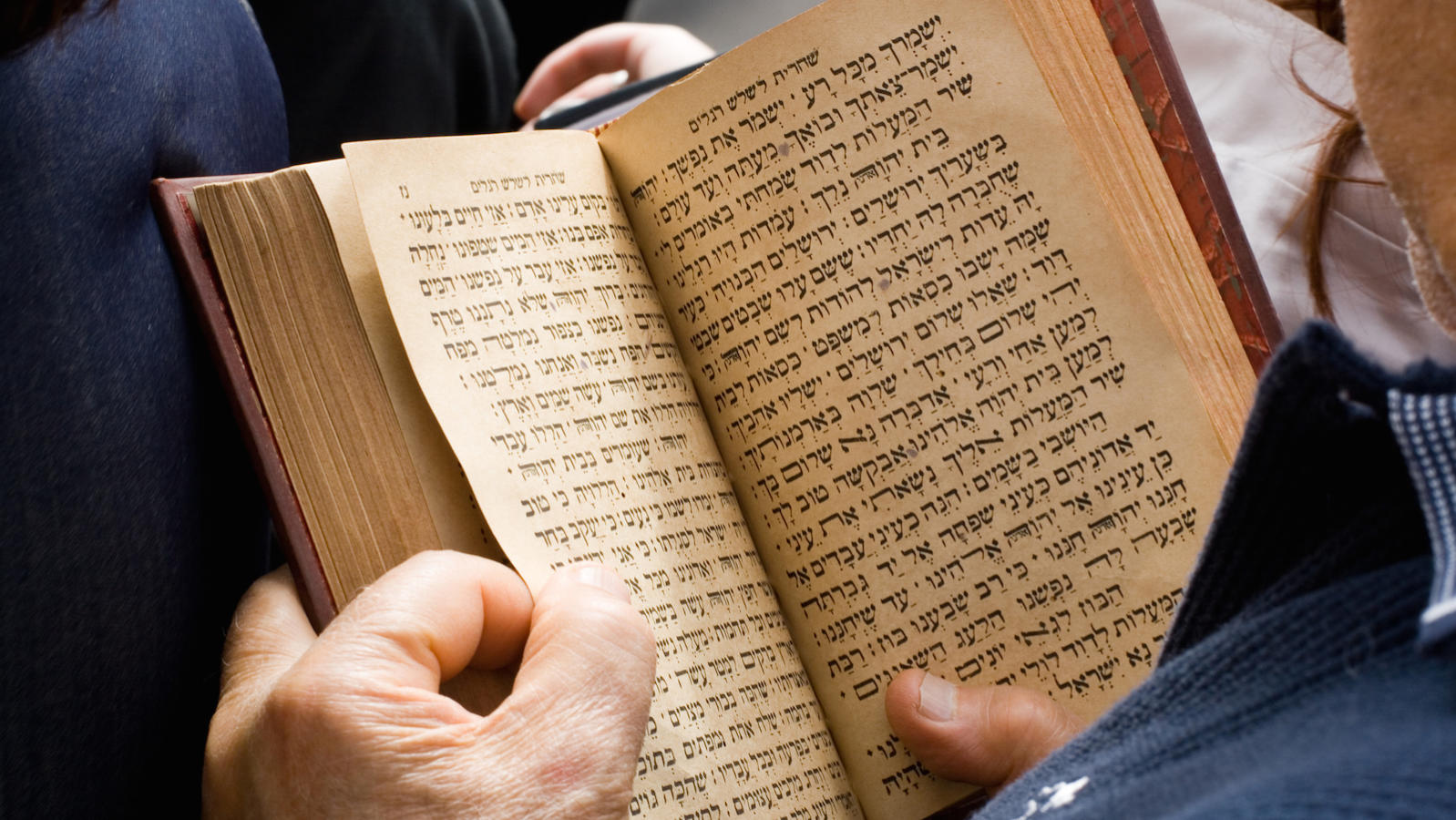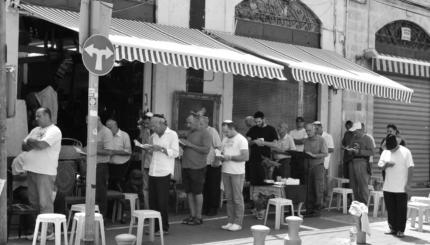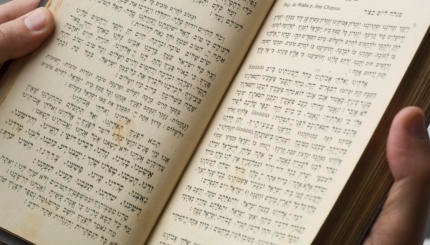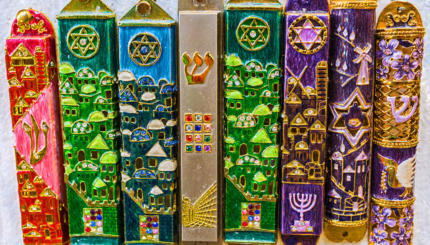Jewish law mandates that one pray three times a day, in the morning, afternoon, and at night. The morning service, Shachrit, formally begins with the Pesukei D’zimrah (verses of praise) section, but before that there are several preliminary prayers and blessings to thank God for providing us with our daily needs and for performing everyday miracles.
Modeh Ani
Traditionally, Jews begin each day with Modeh Ani, a short, two-line prayer which opens by referring to God as the eternal and living king. The prayer speaks of sleeping as a minor type of death in which the soul leaves the body to spend the night with God. The prayer thanks God for returning the soul to the body, enabling the individual to live another day.
This prayer is generally said when one first awakes, while still in bed. For this reason, God’s proper name (“Adonai”) is not used, since the rabbis deemed it improper to speak God’s name before ritually washing the hands.
Indeed, because people are unaware of their actions during sleep, it is possible that they touched something during the night that would make their hands ritually unclean. For these reasons and others, many Jews wash their hands promptly after getting out of bed, pouring water from a cup over their hands either two or three times in succession.

Help us keep Jewish knowledge accessible to millions of people around the world.
Your donation to My Jewish Learning fuels endless journeys of Jewish discovery. With your help, My Jewish Learning can continue to provide nonstop opportunities for learning, connection and growth.
Modeh Ani Text (Courtesy of Sefaria)
מוֹדֶה אֲנִי האשה אומרת: מודָה לְפָנֶיךָ מֶלֶךְ חַי וְקַיָּם שֶהֶחֱזַרְתָּ בִּי נִשְׁמָתִי בְחֶמְלָה, רַבָּה אֱמוּנָתֶךָ:
I am thankful before You, living and enduring King, for you have mercifully restored my soul within me. Great is Your faithfulness.
Listen to Modeh Ani (Courtesy of Mechon Hadar)
Out of Bed and Straight to Prayer: Asher Yatzar
After washing, a blessing is traditionally made, followed by a recitation of verses praising God’s name. Although modern denominations have adapted different sets of prayers, most versions start with a line from Psalms 111, “Fear of God is the beginning of wisdom” (111:10), reminding the newly-awakened Jew of the importance of God.
Following these verses in the (prayerbook) is Asher Yatzar, a prayer normally recited after going to the restroom. The prayer thanks God for creating us completely, with all of our body parts in working order. It declares that if any part of our body were to work in the wrong way, life would be much harder. The blessing ends with a testimony that God “heals all flesh and does wonders.”
While all of the prayers mentioned so far are traditionally said as part of the normal waking cycle, they–and the prayers that follow–are also often recited by individuals at synagogue as the beginning of the Shaharit service.
Asher Yatzar text (Courtesy of Sefaria)
בָּרוּךְ אַתָּה יְהוָֹה אֱלֹהֵינוּ מֶלֶךְ הָעוֹלָם, אֲשֶׁר יָצַר אֶת הָאָדָם בְּחָכְמָה, וּבָרָא בוֹ נְקָבִים נְקָבִים, חֲלוּלִים חֲלוּלִים. גָּלוּי וְיָדוּעַ לִפְנֵי כִסֵּא כְבוֹדֶךָ, שֶׁאִם יִסָּתֵם אֶחָד מֵהֶם, אוֹ אִם יִפָּתֵח אֶחָד מֵהֶם, אִי אֶפְשַׁר לְהִתְקַיֵּם אַפִלּוּ שָׁעָה אֶחָת. בָּרוּךְ אַתָּה יְהֹוָה, רוֹפֵא כָל בָּשָׂר וּמַפְלִיא לַעֲשׂוֹת:
Blessed are You, Hashem, our God, King of the Universe, Who formed man with wisdom and created many openings and cavities within him. It is obvious and known before Your throne of glory that if any one of them were closed or if one of any one them were opened, it would be impossible to exist for even an hour [i.e., a short while]. Blessed are You, Hashem, Who heals all flesh and does wondrous things.
:The Elohai Neshama blessing should immediately follow the Asher Yatzar blessing
אֱלֹהַי, נְשָׁמָה שֶׁנָּתַתָּ בִּי טְהוֹרָה. אַתָּה בְרָאתָהּ, אַתָּה יְצַרְתָּהּ, אַתָּה נְפַחְתָּהּ בִּי, וְאַתָּה מְשַׁמְּרָהּ בְּקִרְבִּי, וְאַתָּה עָתִיד לִטְּלָהּ מִמֶּנִּי, וּלְהַחֲזִירָהּ בִּי לֶעָתִיד לָבוֹא. כָּל זְמַן שֶׁהַנְּשָׁמָה בְּקִרְבִּי מוֹדֶה אֲנִי לְפָנֶיךָ יְהֹוָה אֱלֹהַי וֵאלֹהֵי אֲבוֹתַי. רִבּוֹן כָּל הַמַּעֲשִׂים אֲדוֹן כָּל הַנְּשָׁמוֹת. בָּרוּךְ אַתָּה יְהֹוָה, הַמַּחֲזִיר נְשָׁמוֹת לִפְגָרִים מֵתִים:
My God, the soul that you placed within me is pure. You created it, You formed it, You breathed it into me, and You preserve it within me. And in the future, You will take it from me and restore it in the Time to Come. All the time that this soul is within me, I am thankful before You, Hashem, my God and the God of my fathers, Ruler of all creation, Lord of all the souls. Blessed are You, Hashem, Who restores souls to dead bodies.
The full text for the remaining liturgy discussed in this article can be found here.
Thanks for the Torah
The blessings over study constitute the next major section of the morning prayers. These blessings thank God for giving the Torah to the Jewish people. An additional blessing asks that God help all of Israel to study Torah for its own sake.
Fittingly, these prayers are followed by passages from the Torah and the in order to fulfill the previous blessing of studying. Included in this is the priestly prayer for peace, taken from Numbers 6:24-26 (“May the Lord bless you and protect you. May the Lord shine His countenance for you and be gracious to you. May the Lord lift up His favor upon you and grant you peace.”).
Next up is a mishnah (Peah 1:1) that recounts a group of commandments that are perennial and limitless, namely charity, acts of kindness, and Torah study. This section of prayer ends with a quote from the Talmud (Shabbat 127a) that lists commandments for which one is rewarded both in this world and the world to come. These include honoring parents, acts of kindness, spending time in Jewish institutions, and again, studying Torah.
Following that is a short prayer called Elohai Neshama, which praises God for creating humanity and for helping each person maintain his or her spirit and spirituality. It is the spiritual equivalent to the physically oriented Asher Yatzar blessing. The prayer ends by testifying to God’s control over the human soul.
Now Let Us Join Together
At this point in the service, many traditional congregations begin praying together, starting with Birkhot Hashachar, a list of blessings thanking God for fulfilling our basic needs.
These blessings praise God for giving intelligence and understanding and providing a world in which to live. We thank God for creating us as human beings and as Jews, and for the simple things in life, such as our senses, our bodies, and our freedom. Furthermore, we testify that God looks over the Jewish people, “provides Israel with strength,” and “crowns Israel with glory.”
This includes three blessings which have been a source of controversy. Orthodox liturgy includes two blessings thanking God for not creating us as slaves or as gentiles. The Conservative movement replaces the blessing about slavery by thanking God “for creating me as a free person” and for the second, uses a prayer from the Talmud, thanking God “for creating me an Israelite.”
Dating back to the 14the century Orthodox liturgy dictates that men thank God “for not creating me a woman,” while women recite “for creating me according to Your will.” The Conservative movement replaces this for both men and women by thanking God “for creating me in Your image.”
Generally, congregants say the blessings to themselves and respond “Amen” as the service leader reads them aloud.
The Binding of Isaac
Following Birkhot Hashachar, the story of the binding of Isaac (Genesis 22:1-19) is read to remind God of what Jews throughout history have been willing to do for the sake of heaven. It is followed by a passage called L’olam Yehai Adam, which establishes our covenant with God, and admits that as humans, we are fallible, but because of our ancestors’ righteousness and God’s mercy, we are given life.
Finally, Korbanot, a selection of biblical and Talmudic passages that explain how the service in the Temple operated, is read. Although these passages can be found in most traditional prayer books, reading them has become less common. Because of their focus on animal sacrifice in the Temple many liberal prayer books do not print them at all.
The last passage in this section is a talmudic source that explains the 13 interpretive principles that Rabbi Ishmael used to explain the verses of the Bible. Traditional congregations end with a short prayer for the rebuilding of the Temple, and with that, the first major part of Shachrit, the Pesukei D’Zimrah, is ready to begin.



